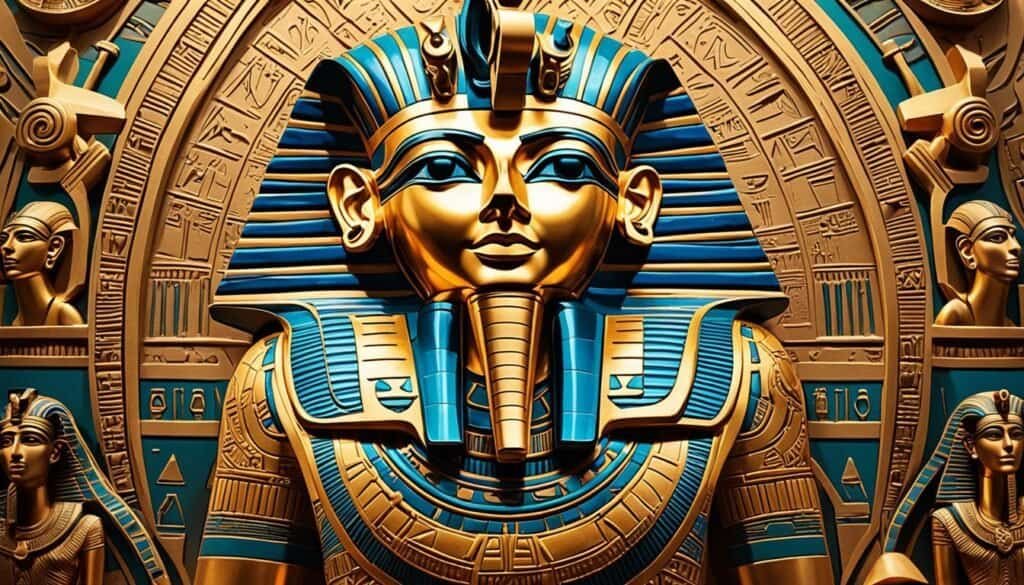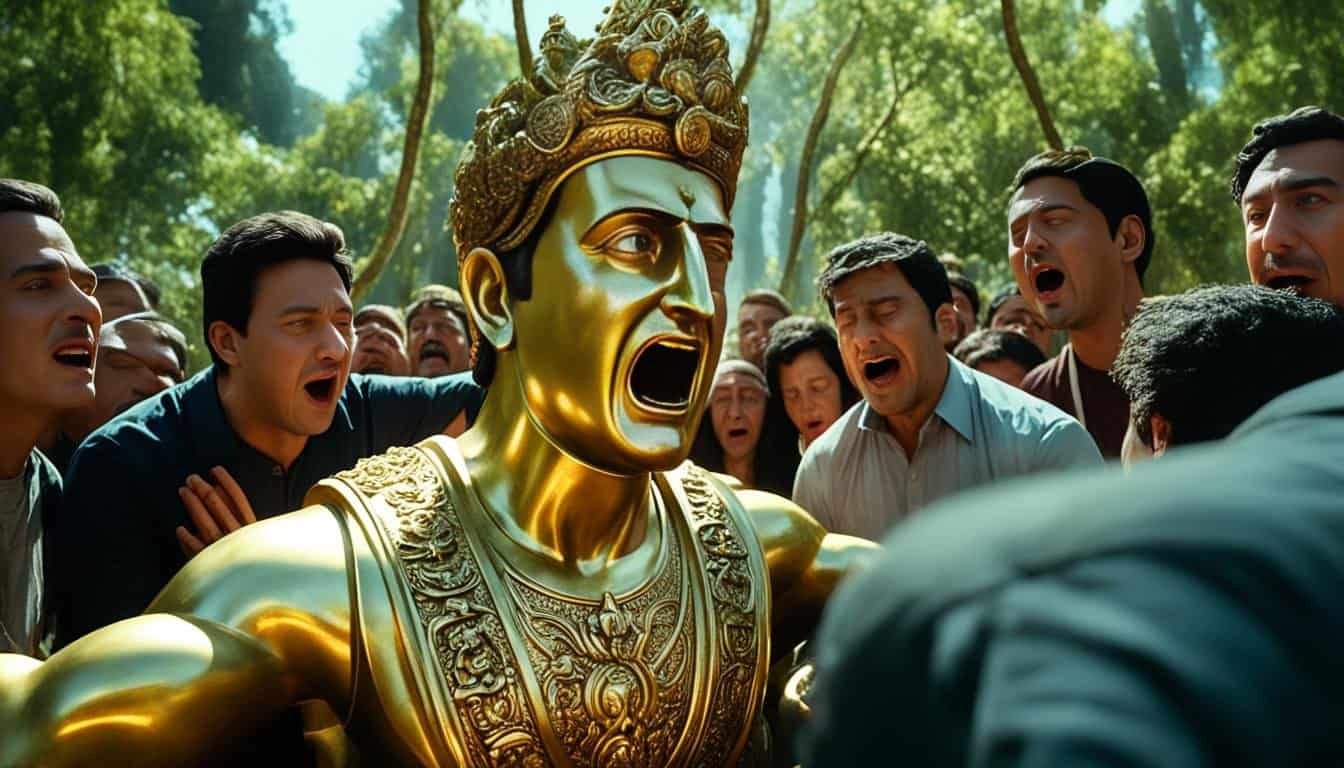Welcome to a journey through Genesis that will make you think. We will look at how we all struggle with faith. We’ll dive into stories of our ancestors. You’ll find eleven surprising cases of idolatry.
This idolatry changed history. Are you ready to question your beliefs? Can you explore the effects of worshiping things over the divine? Let’s get started.
Key Takeaways:
- Idolatry in Genesis reveals humanity’s struggle with faith
- Challenging God’s authority leads to disastrous consequences
- Pride can overshadow true worship
- Attempts to reach the heavens through human constructions can be dangerous
- Idolatry was pervasive in the early world
The Serpent’s Whispers: Challenging God’s Authority (Genesis 3:1-5)
In the book of Genesis, we find a unique form of idolatry. This idolatry isn’t about physical idols. Instead, it features the serpent in the Garden of Eden. This serpent challenged God’s authority, leading to doubt and disobedience.
The serpent spoke to Eve and made her question God’s command. It suggested that not eating from the tree withheld something important from them. This made Eve doubt God’s intentions.
These doubts eventually led Eve to eat the forbidden fruit. It was more than breaking a rule. It was an act of believing she could be like God.
This rebellion against God had huge consequences. It brought sin into the world and broke humanity’s direct connection with Him. From that moment on, faith would be hard, and disobedience common.
“Did God really say, ‘You must not eat from any tree in the garden’?” – Genesis 3:1
In this story, we’re warned about challenging God and hearing those doubts. It reminds us to trust God’s wisdom and follow His commands, no matter what.
Next, we’ll look at another idolatry example from Genesis. It involves Cain’s offering and how it showed a need for approval over true worship of God.
Cain’s Offering: Pride Over True Worship (Genesis 4:3-5)
In Genesis 4:3-5, we learn about Cain and Abel’s offerings to God. Cain, the older brother, gave an offering. However, God didn’t accept his offering. He accepted what Abel brought instead.
Cain’s offering showed he cared more about being noticed than truly worshiping. It was filled with pride. He wanted to show off and get praise, not really honor God.
This story teaches us an important lesson. True worship comes from a humble and honest heart. It’s about recognizing God’s place and obeying with sincerity.
Cain’s mistake was thinking more of himself than God. His focus on his own glory brought trouble. This shows the danger of putting our pride over real worship.
“Pride goes before destruction, and a haughty spirit before a fall.” – Proverbs 16:18
Like Cain, we might also be more interested in our own fame than in real worship of God. We should be careful and think about why we worship.
This story also warns us about the bad things that happen when we’re not humble. Since Cain was envious and mad at Abel, he killed him. His story warns us about the results of turning away from true worship.
Let’s learn from Cain’s mistake. We should come to God with a humble and honest heart. Real worship is about loving God. It’s doing what He wants with great respect.

The Tower of Babel: Humanity’s Attempt to Reach the Heavens (Genesis 11:1-9)
In the book of Genesis, the story of the Tower of Babel stands out. It’s a tale of a massive tower built to reach the skies. The people working on it aimed high but faced some big lessons too.
The project aimed to connect the heights of heaven with the earth below. Through their unity, they built more than a tower; they built ambition. This was about making themselves known.
The drive behind the tower was fueled by self-importance. The workers wanted to be like gods instead of honoring the true divine authority.
But their efforts were in vain. The project didn’t only show their pride but also the risk of valuing earthly success over spiritual connection. The Tower of Babel tale warns us about the dangers of false worship and its effects.
“And they said, ‘Come, let us build ourselves a city, with a tower that reaches to the heavens, so that we may make a name for ourselves; otherwise we will be scattered over the face of the whole earth.'” – Genesis 11:4
Reflecting on the Tower of Babel story teaches us the importance of humility and faith. True devotion is about recognizing divine power and aligning our goals with God’s plan. It’s not about personal glory.
The Tower of Babel narrative highlights the value of being humble and following God’s lead. This way leads to a meaningful life filled with faith.
Studying the Tower of Babel story warns us about pride and the value of a sincere faith. It shows the way to avoid false worship and keep a genuine connection with the divine.
Terah’s Idols: Pervasive Idolatry in the Early World (Joshua 24:2)
In Genesis, we see many cases of idolatry. Terah, father of Abraham, is highlighted for spreading idol worship in the early world. He was into making and selling idols. This shows how common idol worship was back then. It suggests his idols were part of a larger trend in idolatry.
“And Joshua said to all the people, ‘Thus says the LORD, the God of Israel, ‘Long ago, your fathers lived beyond the Euphrates, Terah, the father of Abraham and of Nahor; and they served other gods.'” (Joshua 24:2)
Terah’s story warns us that idolatry was deeply rooted in early culture. The fact that he made and sold idols points to a wide acceptance of idol worship. This makes it clear that many civilizations at that time followed this practice.
Above is an image of an old idol, similar to what Terah might have made. The keyword in the alt text, “Terah’s idols,” shows its direct connection to this topic.
Early people’s idolatry was a search for a direct link to the divine. It showed a desire for something bigger but ended up steering them off from God’s true path.
The Consequences of Idolatry
Idol worship brought about visible harm in the early world. It led to moral decline, fights, and distanced people from God. This flawed their view of divinity and moved them away from true faith.
Terah’s actions in making and vending idols changed history. His deeds influenced Abraham’s faith journey significantly. This highlights the impact of idolatry and the struggle against it in a culture full of idol worship.
| Impact of Terah’s idols and pervasive idolatry |
|---|
| 1. Shaped the culture and beliefs of early civilizations |
| 2. Inhibited the true worship of God |
| 3. Contributed to moral decay and conflicts |
| 4. Challenged individuals’ faith and devotion |
The table outlines the main effects of Terah’s idols and the common practice of idolatry then.
Later in this piece, we will look at more idolatry examples from Genesis. We’ll explore the effects and lessons from mankind’s faith struggles in history.
Laban’s Household Gods: Idolatry and Theft (Genesis 31:19-35)
In the book of Genesis, we find a tale focusing on idolatry and theft. It’s about Rachel, Laban’s daughter, and her brave act of stealing her father’s idols.
The household gods were seen as powerful and protective. They were very important to their culture. Rachel’s theft shows she was not only stealing but also turning away from the true divine to other gods.
In Genesis 31:19-35, we learn how Rachel stole the idols before leaving Laban’s house. Her action was not just a theft. It was a rebellion against her family and her faith in the one true God.
When Laban found out about the theft, he chased after Jacob. A big fight happened. Laban accused Jacob of stealing the gods, but Jacob was innocent. Rachel’s theft was revealed, and she had to face the music.

Rachel’s story in Genesis is a warning about the dangers of idolatry. Her theft of idols teaches us about the pitfalls of abandoning true faith for false gods.
This part looked at the importance of Rachel’s theft. It shows us the risk of idolatry and why staying true to our faith is so crucial.
| Key Points: |
|---|
| Rachel steals Laban’s household gods |
| The idols represented idolatrous worship |
| Laban accuses Jacob of theft |
| Rachel’s theft highlights the consequences of idolatry |
Jacob’s Sons’ Marriages: Risking the Compromise of Faith (Genesis 29)
In Genesis, we learn about Jacob’s sons marrying Canaanite women. Their marriages raised serious questions about future faith.
A Risky Union:
Jacob’s sons married Canaanite women. These women followed a different faith, risking the family’s beliefs. Marrying outside their faith introduced foreign religious practices.
This mix of their faith with other cultures made keeping their beliefs hard. Did they stay true to their faith, or did it change because of their wives?
The Danger of Compromising Faith:
Jacob’s sons faced tough choices. They battled to keep their faith against the temptations of the day. The pressure to worship idols was strong.
Did marrying Canaanite women weaken their faith? We explore how their decisions influenced their spiritual paths. Did they stand firm against these challenges?
Lessons for Today:
Looking at Jacob’s sons’ stories makes us think about our own situations. Today, we also deal with pressures to change our faith.
This story teaches us about keeping our faith strong in a changing world. We learn from Jacob’s sons’ experiences on staying true to our beliefs.
| Son | Spouse | Beliefs |
|---|---|---|
| Reuben | Leah | – |
| Simeon | Leah | – |
| Levi | Leah | – |
| Judah | Leah | – |
| Dan | Bilhah | Canaanite |
| Naphtali | Bilhah | Canaanite |
| Gad | Zilpah | – |
| Asher | Zilpah | – |
| Issachar | Leah | – |
| Zebulun | Leah | – |
| Joseph | Asenath | Egyptian |
| Benjamin | Rachel | Canaanite |
The table summarizes Jacob’s sons, their wives, and their various beliefs. It shows us the different situations each couple faced and their potential struggles.

The image simplifies a complex topic – Jacob’s sons’ varied marriages and the risk to their faith. It shows the clash of beliefs in a family.
Joseph’s Egyptian Idols: Faithfulness in a Foreign Land (Genesis 41)
Idol worship was common in Egypt when Joseph was there. The people believed these idols had special powers. Despite this, Joseph stayed true to his faith and devotion to God.
When Joseph interpreted Pharaoh’s dreams, he gave credit to God. He didn’t use the idols for wisdom. Because of his loyalty, Joseph rose to a high position in Egypt. He also played a key role in saving Egypt and his own family from starvation.
“It is not in Joseph’s Egyptian idols, but in God that the interpretation of dreams resides. God has revealed to Pharaoh what he is about to do.”
Joseph’s trust in God was stronger than the idols around him. He didn’t let the culture change his beliefs. This showed his strong will and faith in God.
Joseph’s story pushes us to be faithful in tough times. It reminds us to hold onto what we believe in, even when it’s hard. Like Joseph, staying loyal to our faith can bring us blessings and God’s help.

The Golden Calf: Blatant Violation of the First Two Commandments (Exodus 32)
Moses went up Mount Sinai to get the commandments from God. The Israelites got scared and impatient. They made a golden calf, breaking the first two commandments.
The golden calf showed they didn’t respect God’s control. They didn’t trust His plans. Instead, they turned to a false god for safety.
This action was a sign of their weak faith. It also broke their deal with God. The deal clearly says not to worship anything but God.
“And Aaron said unto them, Break off the golden earrings, which are in the ears of your wives, of your sons, and of your daughters, and bring them unto me. And all the people break off the golden earrings which were in their ears and brought them unto Aaron. And he received them at their hand and fashioned it with a graving tool, after he had made it a molten calf: and they said, These be thy gods, O Israel, which brought thee up out of the land of Egypt.”
The verses in Exodus 32 show how the Israelites linked the calf to their escape from Egypt. They thought the calf, not God, saved them. This was a big mistake against God’s rules.
Worshiping the gold calf warns us about idolatry’s dangers. It shows how we’re pulled to symbols of wealth and safety. This story teaches us to always put trust in the real God.
Consequences of Idolatry
The Israelites faced God’s wrath for their calf worship. Moses saw this and broke the commandment stones. God punished the people with a plague.
Moses acted swiftly. He destroyed the calf and made people drink its dust. This was to show the evil of idolatry and to push repentance.
The event with the golden calf was critical for the Israelites. It showed how weak faith can be, and the importance of following God’s rules. This warns us against idolatry’s dangers even today.
The Teraphim and Judah’s Sin: Lingering Attachments and Misplaced Focus (Genesis 35:2-4, Genesis 38)
In the final chapter, we find an interesting story of idolatry in Genesis. Rachel kept the stolen idols, called teraphim, even after she left home. This highlights a strong pull towards idol worship throughout her life.
The tale of Judah also stands out. His sin wasn’t about idols directly. It was more about forgetting what’s truly important. This led him to not follow God’s ways and weaken his faith.
Rachel and Judah’s stories show the tricky nature of idolatry. It can show up in unexpected ways. Even little things, like stolen idols or losing focus, can pull us away from God. This reminds us to be on guard and always keep our faith strong.
As we finish reflecting on Genesis, we think about idolatry and the pull of worshiping other things. The stories in Genesis warn us about the bad outcomes of idol worship. They inspire us to keep our faith pure and focused on God alone.
Affiliate Disclosure: "As an Amazon Associate I earn from qualifying purchases made from links in this post. We are a participant in the Amazon Services LLC Associates Program, an affiliate advertising program designed to provide a means for us to earn fees by linking to Amazon.com."

